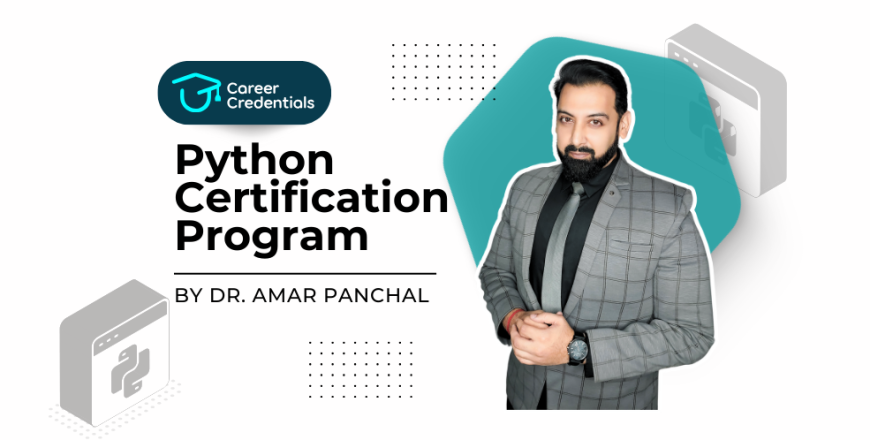
Welcome to Python Certification Program by Dr. Amar Panchal, your first step into the world of computer programming! Beginners with little to no prior coding experience are the target audience for this course. You will gain a solid foundation for further investigation in the field of software development by learning the principles of the Python programming language through a series of structured lessons and practical activities.
Grasp the Basics: Gain a thorough understanding of the fundamental ideas of programming, such as operators, data types, variables, and control flow structures.
Develop Problem-Solving Skills: Take on basic Python programming tasks and challenges to hone your problem-solving skills.
Write Simple Programs : Develop the confidence to create and run basic Python programs that carry out basic functions like conditional operations, arithmetic computations, and input/output activities.
Understand Program Structure: Discover the fundamentals of Python programming, including loops, conditions, functions, and keywords.
Become acquainted with debugging: Learn how to debug your code so that you can find and address common mistakes and defects.
Introduction to Python: Understand the history and significance of the object-oriented Python programming language. Put together your development environment and write your first program.
Control Flow Structures: Learn to use loops (while and for loops) and if-else statements, which are examples of control flow structures, to manipulate the program’s execution flow.
Operators and Expressions: Examine the use of assignment, logical, relational, and arithmetic operators in statements and expressions.
Variables and Data Types: Discover the various variable types, data types (integers, floating-point numbers, characters), and how to use them in Python programming.
Arrays: Learn how to declare and initialize arrays, retrieve array items, and perform simple operations on arrays.
Input/Output Operations: Discover the fundamentals of Python’s input/output functions, such as how to format input and output using printf and scanf.
Novices without Any Past Experience: Individuals who are new to programming and eager to learn the fundamentals of Python programming from scratch.
Students Pursuing Computer Science or Related Fields: Undergraduate or graduate students enrolled in computer science, software engineering, or related programs who seek supplementary learning resources to reinforce their academic studies.
Career Switchers: Professionals from non-technical backgrounds who aspire to transition into software development roles and require comprehensive training to kickstart their new careers.
Self-taught Programmers: Individuals who have already dabbled in programming through self-study or online tutorials and now seek structured guidance to deepen their understanding and fill in any knowledge gaps.
Junior Developers: Entry-level programmers who have some basic experience with coding but wish to expand their skill set and improve their proficiency in specific programming languages like Python or frameworks.
Dr. Amar Panchal possesses over 15+ years of experience in the corporate sector and has dedicated 13+ years to teaching Programming Languages and Technologies. He is the Visionary behind Career Credentials. He holds a master’s in computer science from UTA, which contributes to his expertise in the field. Over the years, he has developed an innovative approach to teaching, simplifying complex subjects with relatable examples. He is recognized for his proficiency in conducting Corporate Training modules across Various Technologies. Dr. Amar Panchal is known for seamlessly blending extensive industry experience with a passion for making learning engaging and accessible.
For more such resources and Practise Interview Questions refrences,do visit Python Notes by Career Credentials and 100 Most Asked Python QnA by Career Credentials
Prepare yourself to delve into our resource portal, Prepcrazy featuring programming notes, informative books, interview question sets, coding platforms, and much more. Feel free to explore it whenever you can!
https://colab.research.google.com/drive/1nZazX6Qfkc2uwEj63XZN4Ixbn5ziXTLr?usp=sharing
https://colab.research.google.com/drive/10TI7RapGy4tlFeSg9Shz111CPCkt5IU6?usp=sharing
https://colab.research.google.com/drive/1324wojBfkoXB4wokl0vbqbNBPONRn5v7?usp=sharing
https://colab.research.google.com/drive/1L0C9KVDWGA2-NqQPlUOsMHzZTEceq9cT?usp=sharing
https://colab.research.google.com/drive/1QErj1JAz5GoSGcdQdSJngpE1Wi-7ebPn?usp=sharing
https://colab.research.google.com/drive/1UgdAGKO8OBQUvMmWJb1X3BFX6TNWR0d0?usp=sharing
https://colab.research.google.com/drive/1rfTnK1Huo4XrtupPOs9SJg6k46ovzg9Z?usp=sharing
https://colab.research.google.com/drive/1hIKeLZItYFONTbNDitA6-DzWASUOP3qC?usp=sharing
https://colab.research.google.com/drive/1v07uFA6KgT3NDmmSh--n9wAiNH8DY9J_?usp=sharing